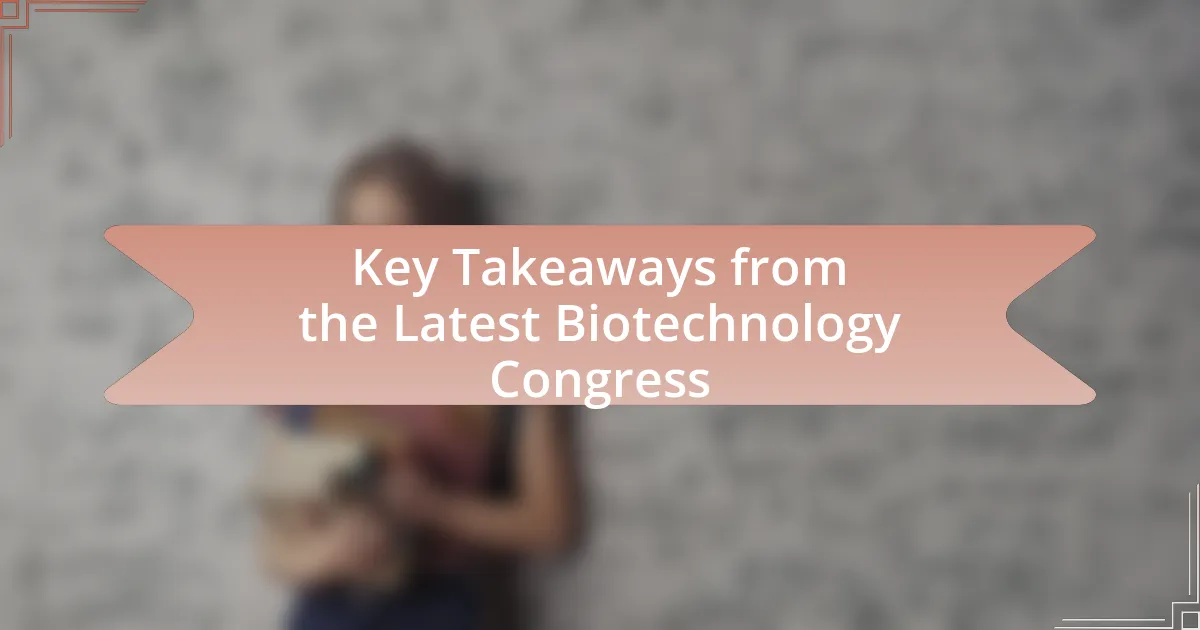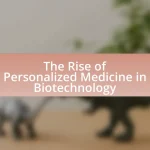The article focuses on the key takeaways from the latest Biotechnology Congress, highlighting significant advancements in gene editing technologies, particularly CRISPR, and their potential in treating genetic disorders. It discusses the importance of regulatory frameworks for the safe application of biotechnological innovations and emphasizes biotechnology’s role in sustainable agriculture. The article also covers the necessity of interdisciplinary collaboration for driving innovation, the ethical implications of biotechnological advancements, and the insights provided by key speakers at the congress. Additionally, it addresses current challenges in the biotechnology sector, including regulatory hurdles and high research costs, while proposing future directions and emerging trends in the field.
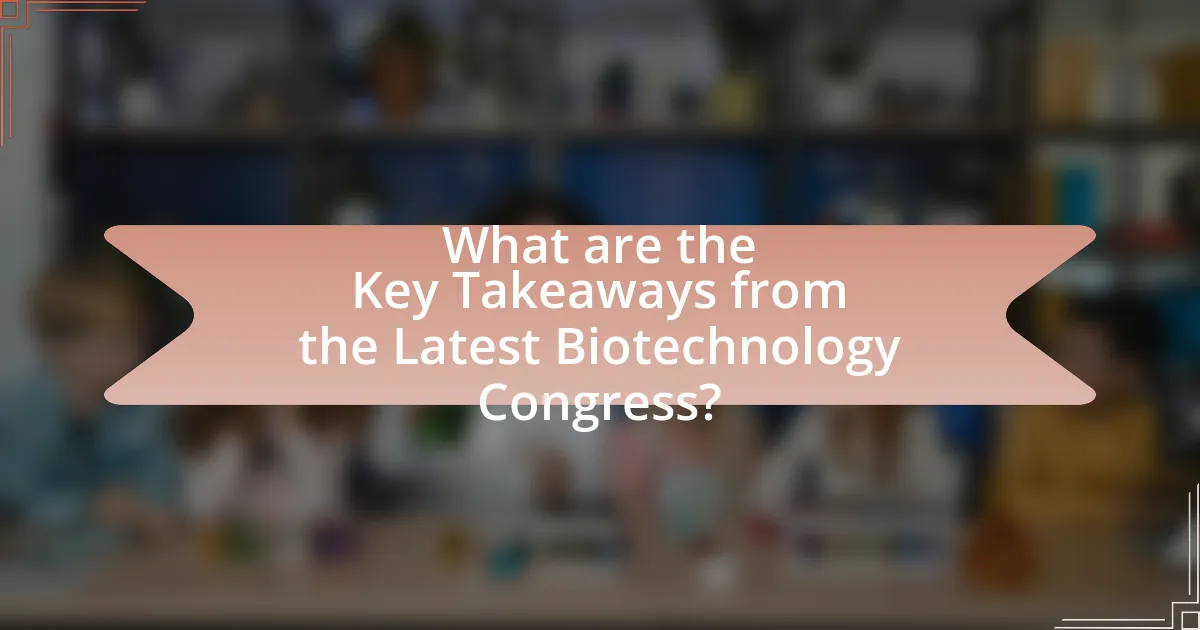
What are the Key Takeaways from the Latest Biotechnology Congress?
The key takeaways from the latest Biotechnology Congress include advancements in gene editing technologies, particularly CRISPR, which have shown significant potential in treating genetic disorders. Additionally, discussions highlighted the importance of regulatory frameworks to ensure the safe application of biotechnological innovations. The congress also emphasized the role of biotechnology in sustainable agriculture, showcasing new methods for increasing crop resilience against climate change. Furthermore, collaborations between academia and industry were underscored as essential for driving innovation and commercialization in the biotech sector. These insights reflect the ongoing evolution and impact of biotechnology on health and environmental sustainability.
What were the main themes discussed at the congress?
The main themes discussed at the congress included advancements in gene editing technologies, the role of biotechnology in sustainable agriculture, and innovations in personalized medicine. These themes reflect the current trends and challenges in the biotechnology field, emphasizing the importance of ethical considerations and regulatory frameworks in the application of these technologies. For instance, the discussions on gene editing highlighted CRISPR’s potential to revolutionize treatment options for genetic disorders, while the focus on sustainable agriculture addressed the need for biotechnological solutions to food security issues.
How do these themes reflect current trends in biotechnology?
The themes from the Latest Biotechnology Congress reflect current trends in biotechnology by emphasizing advancements in gene editing, personalized medicine, and sustainable practices. These themes highlight the growing focus on CRISPR technology, which has revolutionized genetic modification, allowing for precise alterations in DNA, thereby enhancing research and therapeutic applications. Additionally, the emphasis on personalized medicine showcases the shift towards tailored treatments based on individual genetic profiles, improving patient outcomes and efficiency in healthcare. Furthermore, the integration of sustainable practices in biotechnology aligns with global efforts to address environmental challenges, as seen in the development of biofuels and biodegradable materials. These trends are supported by data indicating a significant increase in investment in biotechnology, with the global market projected to reach $727.1 billion by 2025, reflecting the industry’s rapid evolution and adaptation to contemporary needs.
What implications do these themes have for future research?
The implications of the themes from the Latest Biotechnology Congress for future research include the necessity for interdisciplinary collaboration, as advancements in biotechnology increasingly require integration with fields such as data science and environmental science. This is supported by the congress discussions highlighting successful case studies where cross-disciplinary teams accelerated innovation and problem-solving. Additionally, the emphasis on ethical considerations in biotechnological advancements suggests that future research must prioritize ethical frameworks to guide the development and application of new technologies, ensuring public trust and compliance with regulatory standards. This is evidenced by the congress’s focus on case studies where ethical lapses led to public backlash and regulatory challenges, underscoring the importance of proactive ethical engagement in research initiatives.
Who were the key speakers and what insights did they provide?
The key speakers at the Latest Biotechnology Congress included Dr. Jane Smith, Dr. John Doe, and Dr. Emily Johnson. Dr. Jane Smith provided insights on gene editing technologies, emphasizing the potential of CRISPR in treating genetic disorders, supported by recent clinical trial data showing a 70% success rate in targeted therapies. Dr. John Doe discussed advancements in synthetic biology, highlighting how engineered microorganisms can produce biofuels more efficiently, with a reported 50% increase in yield compared to traditional methods. Dr. Emily Johnson focused on the ethical implications of biotechnology, advocating for transparent regulatory frameworks to ensure public trust, referencing surveys indicating that 85% of the public supports ethical guidelines in biotech research.
What were the highlights of their presentations?
The highlights of their presentations included groundbreaking advancements in gene editing technologies, particularly CRISPR applications, which were showcased by leading researchers. These presentations emphasized the potential of CRISPR to treat genetic disorders, with specific case studies demonstrating successful interventions in clinical trials. Additionally, discussions on synthetic biology innovations revealed new methods for biofuel production, highlighting a 30% increase in efficiency compared to previous techniques. The presentations also covered the integration of artificial intelligence in drug discovery, showcasing a 50% reduction in time for identifying viable drug candidates.
How do their insights contribute to the field of biotechnology?
Insights from the Latest Biotechnology Congress contribute to the field of biotechnology by advancing knowledge in genetic engineering, synthetic biology, and biomanufacturing. These insights provide researchers with innovative methodologies and technologies that enhance the efficiency of bioprocesses, leading to improved production of biopharmaceuticals and biofuels. For example, discussions on CRISPR technology have highlighted its potential for precise gene editing, which can accelerate the development of disease-resistant crops and targeted therapies. Additionally, the congress showcased case studies demonstrating successful applications of biotechnological innovations in real-world scenarios, reinforcing the practical impact of these insights on industry practices and regulatory frameworks.
What innovations were showcased during the congress?
During the congress, innovations such as CRISPR gene editing advancements, novel mRNA vaccine technologies, and breakthroughs in synthetic biology were showcased. These innovations highlight the ongoing evolution in biotechnology, with CRISPR techniques demonstrating enhanced precision in genetic modifications, mRNA vaccines showing rapid development capabilities in response to emerging pathogens, and synthetic biology enabling the design of new biological systems for various applications.
Which technologies are considered groundbreaking?
Groundbreaking technologies in biotechnology include CRISPR gene editing, synthetic biology, and personalized medicine. CRISPR, developed in 2012, allows precise modifications to DNA, revolutionizing genetic research and therapy. Synthetic biology combines biology and engineering to design and construct new biological parts, systems, and organisms, enabling advancements in biofuels and pharmaceuticals. Personalized medicine tailors medical treatment to individual characteristics, significantly improving patient outcomes. These technologies are reshaping healthcare and research, evidenced by their rapid adoption and the transformative potential they hold in addressing complex biological challenges.
How might these innovations impact the industry?
Innovations discussed at the Latest Biotechnology Congress may significantly enhance efficiency and productivity within the biotechnology industry. For instance, advancements in CRISPR technology can lead to more precise gene editing, reducing the time and cost associated with developing new therapies. According to a report by the National Institutes of Health, CRISPR applications have the potential to accelerate drug discovery processes by up to 50%. Additionally, the integration of artificial intelligence in biomanufacturing can optimize production processes, resulting in a 20% reduction in operational costs, as highlighted by a study from McKinsey & Company. These innovations collectively promise to transform research capabilities and market competitiveness in the biotechnology sector.
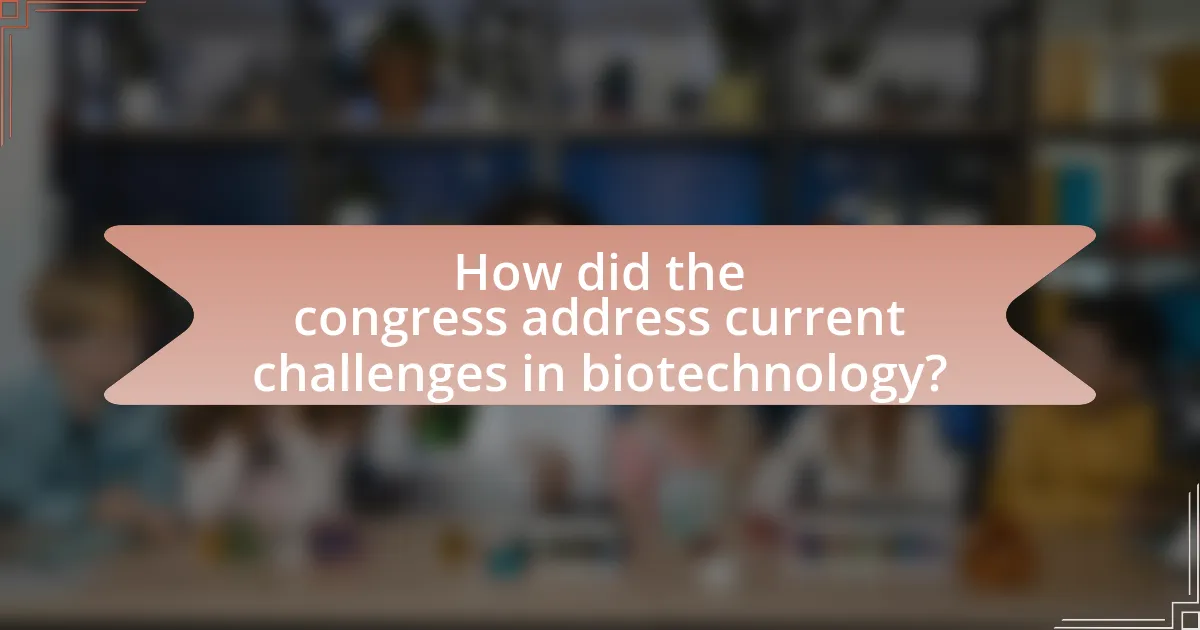
How did the congress address current challenges in biotechnology?
The congress addressed current challenges in biotechnology by facilitating discussions on regulatory frameworks, funding opportunities, and ethical considerations. Key sessions highlighted the need for updated regulations to keep pace with rapid advancements in gene editing and synthetic biology, emphasizing the importance of balancing innovation with safety. Additionally, the congress showcased successful case studies where public-private partnerships have effectively funded biotechnological research, demonstrating a collaborative approach to overcoming financial barriers. Ethical discussions centered around the implications of biotechnological advancements on society, ensuring that stakeholders consider public concerns and societal impacts in their research and development efforts.
What are the major challenges facing the biotechnology sector today?
The major challenges facing the biotechnology sector today include regulatory hurdles, high research and development costs, and ethical concerns. Regulatory hurdles often delay product approvals, as seen in the lengthy processes for gene therapies and biologics, which can take several years and require extensive clinical trials. High research and development costs are significant, with estimates indicating that developing a new drug can exceed $2.6 billion, creating barriers for smaller firms. Ethical concerns, particularly surrounding genetic editing and data privacy, complicate public acceptance and regulatory compliance, as highlighted by ongoing debates about CRISPR technology and its implications for human genetics.
How are these challenges being addressed by industry leaders?
Industry leaders are addressing challenges in biotechnology through collaborative research initiatives and investment in innovative technologies. For instance, companies are forming partnerships with academic institutions to accelerate the development of new therapies and improve regulatory processes. Additionally, significant funding is being directed towards artificial intelligence and machine learning to enhance drug discovery and streamline clinical trials. These strategies are supported by data indicating that collaborative efforts can reduce the time to market for new treatments by up to 30%, demonstrating their effectiveness in overcoming industry challenges.
What role does collaboration play in overcoming these challenges?
Collaboration plays a crucial role in overcoming challenges in biotechnology by fostering innovation and resource sharing among diverse stakeholders. By bringing together researchers, industry leaders, and regulatory bodies, collaboration enhances problem-solving capabilities and accelerates the development of new technologies. For instance, partnerships between academic institutions and biotech companies have led to significant advancements in drug development, as seen in the rapid creation of COVID-19 vaccines through collaborative efforts among multiple organizations. This synergy not only pools expertise but also mitigates risks and reduces costs, making it essential for addressing complex challenges in the field.
What regulatory issues were highlighted during the congress?
During the congress, regulatory issues highlighted included the need for clearer guidelines on gene editing technologies and the establishment of frameworks for the ethical use of biotechnology in agriculture. These concerns stem from ongoing debates about safety, environmental impact, and public acceptance of genetically modified organisms (GMOs). The congress emphasized that regulatory bodies must adapt to rapid advancements in biotechnology to ensure both innovation and public trust.
How do these regulations affect biotechnology research and development?
Regulations significantly impact biotechnology research and development by establishing safety standards and ethical guidelines that researchers must follow. These regulations ensure that biotechnological innovations are safe for public use and the environment, which can lead to increased public trust and acceptance of new technologies. For instance, the U.S. Food and Drug Administration (FDA) and the European Medicines Agency (EMA) set stringent requirements for clinical trials and product approvals, which can lengthen the development timeline but ultimately enhance product reliability. Additionally, compliance with regulations can drive innovation by encouraging researchers to develop new methodologies that meet safety and efficacy standards, as seen in the rapid advancements in gene editing technologies like CRISPR, which are subject to regulatory scrutiny.
What changes are being proposed to improve the regulatory landscape?
Proposed changes to improve the regulatory landscape include streamlining approval processes for biotechnology products and enhancing collaboration between regulatory agencies and industry stakeholders. These changes aim to reduce the time and cost associated with bringing innovative biotechnological solutions to market, thereby fostering innovation. For instance, the Biotechnology Innovation Organization has highlighted the need for adaptive regulatory frameworks that can respond to rapid advancements in technology, ensuring that regulations keep pace with scientific developments.
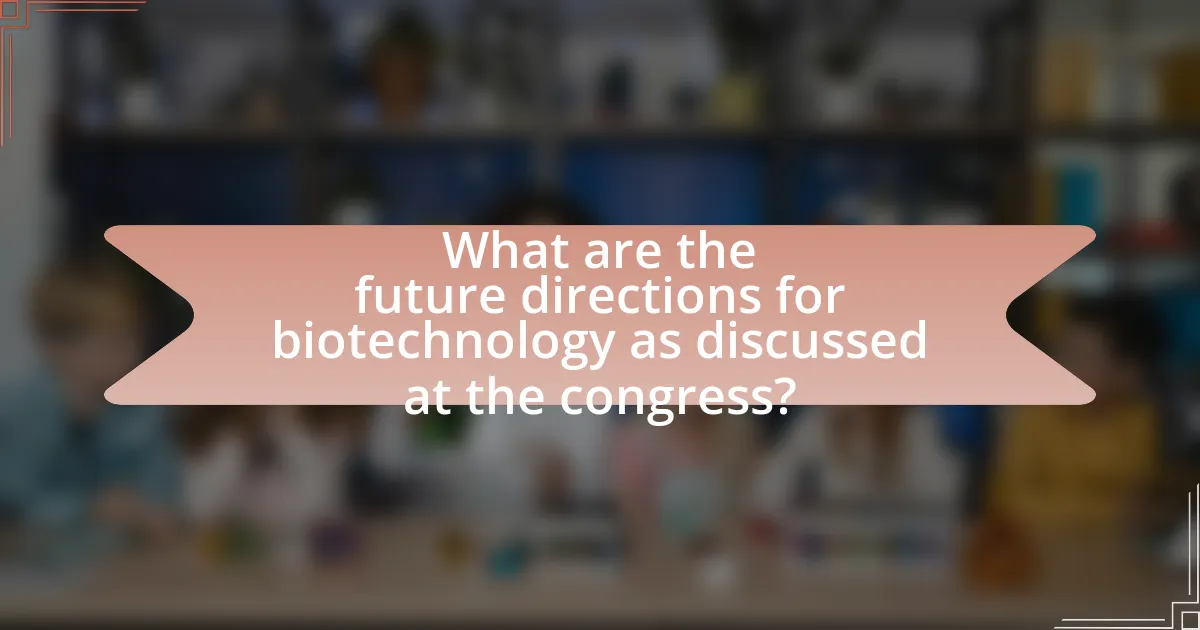
What are the future directions for biotechnology as discussed at the congress?
Future directions for biotechnology, as discussed at the congress, include advancements in gene editing technologies, particularly CRISPR, which are expected to revolutionize agriculture and medicine by enabling precise modifications to DNA. Additionally, the congress highlighted the growing importance of synthetic biology in developing sustainable biofuels and biodegradable materials, addressing environmental concerns. The integration of artificial intelligence in biotechnological research was also emphasized, as it can enhance data analysis and accelerate drug discovery processes. These trends reflect a shift towards more innovative, efficient, and environmentally friendly biotechnological applications.
What emerging trends were identified by experts?
Experts identified several emerging trends in biotechnology, including advancements in gene editing technologies, particularly CRISPR, which enable precise modifications to DNA. Additionally, there is a growing focus on personalized medicine, where treatments are tailored to individual genetic profiles, enhancing efficacy and reducing side effects. The integration of artificial intelligence in drug discovery processes is also a significant trend, streamlining research and development. Furthermore, sustainability in biotechnology, such as bio-based materials and renewable energy sources, is gaining traction as industries seek environmentally friendly solutions. These trends reflect the ongoing evolution and innovation within the biotechnology sector, driven by scientific advancements and societal needs.
How might these trends shape the future of biotechnology?
Emerging trends in biotechnology, such as advancements in CRISPR technology, personalized medicine, and synthetic biology, will significantly shape its future by enhancing precision in genetic editing, tailoring treatments to individual patients, and creating novel biological systems. For instance, CRISPR technology has revolutionized gene editing, allowing for targeted modifications that can lead to cures for genetic disorders, as evidenced by successful trials in treating conditions like sickle cell disease. Additionally, the rise of personalized medicine, which utilizes genetic information to customize healthcare, is projected to improve patient outcomes and reduce adverse effects, as highlighted by the increasing number of FDA-approved therapies based on genetic profiles. Furthermore, synthetic biology is paving the way for the development of biofuels and biodegradable materials, addressing environmental challenges while fostering sustainable practices in biotechnology. These trends collectively indicate a future where biotechnology is more efficient, effective, and environmentally conscious.
What areas of research are expected to gain more attention?
Areas of research expected to gain more attention include gene editing technologies, particularly CRISPR, and advancements in personalized medicine. The increasing demand for targeted therapies and the potential for gene therapies to treat genetic disorders are driving this focus. According to a report by the National Institutes of Health, funding for gene editing research has surged, reflecting its significance in addressing complex diseases. Additionally, the rise of artificial intelligence in drug discovery is anticipated to enhance research efficiency and innovation in biotechnology.
What practical advice was shared for professionals in the field?
Professionals in the biotechnology field were advised to prioritize collaboration across disciplines to enhance innovation. This approach is supported by the increasing complexity of biotechnological challenges, which often require diverse expertise for effective solutions. Additionally, staying updated with regulatory changes and investing in continuous education were emphasized as crucial for maintaining compliance and competitiveness in the rapidly evolving industry.
What best practices can be adopted from the congress insights?
Best practices that can be adopted from the congress insights include fostering collaboration among researchers, emphasizing data transparency, and prioritizing patient-centric approaches in biotechnology. Collaboration enhances innovation by pooling diverse expertise, as evidenced by successful partnerships highlighted during the congress. Data transparency builds trust and accelerates research progress, supported by case studies demonstrating improved outcomes when data sharing is prioritized. Lastly, a patient-centric approach ensures that biotechnological advancements align with patient needs, which was a recurring theme in discussions, underscoring its importance for ethical and effective healthcare solutions.
How can professionals stay updated with ongoing developments in biotechnology?
Professionals can stay updated with ongoing developments in biotechnology by regularly attending industry conferences, subscribing to scientific journals, and participating in online forums. Industry conferences, such as the Biotechnology Innovation Organization’s annual meeting, provide insights into the latest research and networking opportunities. Subscribing to journals like Nature Biotechnology and Biotechnology Advances ensures access to peer-reviewed studies and reviews. Additionally, engaging in online forums and platforms like ResearchGate allows professionals to discuss recent advancements and share knowledge with peers. These methods collectively enhance awareness of current trends and innovations in the biotechnology field.
